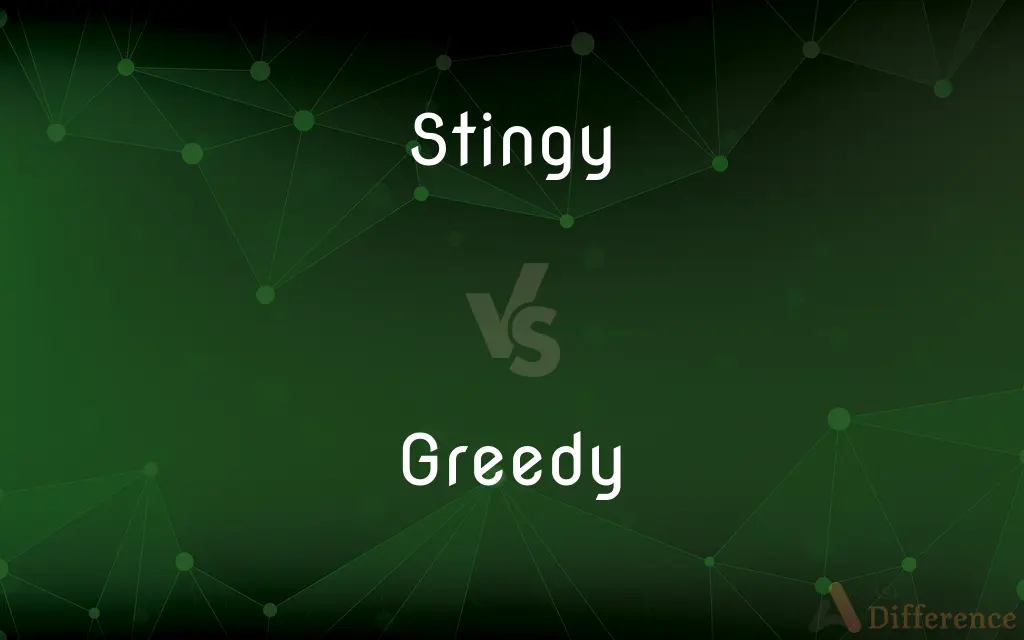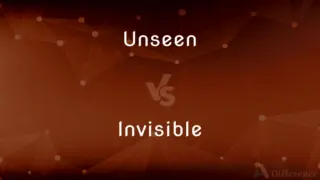Stingy vs. Greedy — What's the Difference?
By Fiza Rafique & Urooj Arif — Updated on April 8, 2024
Stingy individuals are reluctant to spend or share, focusing on conservation, while greedy people have an excessive desire for more, often at others' expense.

Difference Between Stingy and Greedy
Table of Contents
ADVERTISEMENT
Key Differences
Stingy behavior is marked by an extreme unwillingness to spend, share, or use resources, often to the point of being overly cautious or parsimonious. Individuals who are stingy prioritize saving and are highly resistant to parting with their possessions or money, regardless of necessity. Whereas greedy individuals are driven by an insatiable desire to acquire more than they need or deserve, often going beyond mere financial or material possessions to include power, status, or food. Greed involves the relentless pursuit of excess, regardless of need or the impact on others.
While stinginess can sometimes be seen in a slightly more positive light, as a form of frugality or careful financial management, it can also lead to social isolation or criticism for not participating in communal sharing or generosity. On the other hand, greed is almost universally viewed negatively, as it implies a selfish and excessive consumption or accumulation, often at the expense of others and without consideration for the broader consequences.
Stingy people often justify their behavior with a focus on future security and the fear of potential loss, indicating a defensive stance towards their resources. They might avoid spending on both essentials and luxuries alike, demonstrating a preference for minimalism or simplicity, albeit to an extreme. In contrast, greedy individuals are typically motivated by the desire for more, driven by an internal void or a belief that accumulation will lead to happiness or power, often ignoring the law of diminishing returns.
One might encounter stinginess in everyday scenarios, such as tipping minimally at restaurants, skimping on gifts, or avoiding financial contributions to group activities. Greed, however, manifests in larger-scale actions, such as exploiting others for financial gain, hoarding wealth without intention to use it beneficially, or engaging in corrupt practices to accumulate more resources or power.
The societal and relational impacts of stinginess and greed also differ significantly. Stinginess can harm personal relationships, leading to perceptions of selfishness or lack of care. Meanwhile, greed can have broader implications, including economic inequality, social unrest, and environmental degradation, as it often involves exploiting people and resources without regard for sustainability or equity.
ADVERTISEMENT
Comparison Chart
Focus
Conservation of resources
Acquisition of excess
Perception
Negative (less severe than greed), can be seen as frugal
Strongly negative, associated with selfishness
Motivation
Fear of loss, future security
Desire for more, internal void
Impact on Others
Minimal participation in communal sharing, perceived as cheap
Exploitation, contribution to inequality
Societal Impact
Limited, mostly personal or within close relationships
Broad, including economic and environmental consequences
Compare with Definitions
Stingy
Unwilling to spend money; penny-pinching.
The stingy man refused to even buy a coffee for his friend.
Greedy
Having an excessive desire for more than one needs or deserves.
The greedy businessman hoarded wealth beyond measure.
Stingy
Characterized by a lack of generosity; tightfisted.
Her stingy approach to charity donations surprised everyone.
Greedy
Driven by avarice; insatiable.
Her greedy ambitions led her to betray her own family.
Stingy
Economizing to an extreme degree.
Their stingy lifestyle meant living without basic comforts.
Greedy
Ignoring ethical considerations in pursuit of gain.
Their greedy practices resulted in widespread community backlash.
Stingy
Reluctant to share with others.
He was so stingy with his knowledge, rarely helping his colleagues.
Greedy
Eager for material wealth.
He showed a greedy interest in the estate's inheritance.
Stingy
Minimal in quantity or quality.
The stingy portion sizes left everyone hungry.
Greedy
Consuming more than necessary.
The greedy consumption of resources alarmed environmentalists.
Stingy
Selfishly unwilling to share with others
Greedy
Having a keen desire for anything; vehemently desirous; eager to obtain; avaricious; as, greedy of gain.
Stingy
Giving or spending reluctantly.
Greedy
Having or showing a strong or excessive desire to acquire money or possess things, especially wishing to possess more than what one needs or deserves.
Stingy
Scanty or meager
A stingy meal.
Stingy with details about the past.
Greedy
Having or showing a desire to eat or drink in large or excessive amounts.
Stingy
Unwilling to spend, give, or share; ungenerous; mean
Greedy
Extremely eager or desirous for an activity or pursuit
Greedy for the opportunity to prove their ability.
Stingy
Small, scant, meager, insufficient
Greedy
Having greed; consumed by selfish desires.
Stingy
(informal) Stinging; able or inclined to sting.
Greedy
Prone to overeat.
Stingy
Stinging; able to sting.
Greedy
(regular expressions) Tending to match as much text as possible.
This regular expression performs a greedy match.
Stingy
Extremely close and covetous; meanly avaricious; niggardly; miserly; penurious; as, a stingy churl.
A stingy, narrow-hearted fellow that had a deal of choice fruit, had not the heart to touch it till it began to be rotten.
Greedy
That tries to find the global optimum by finding the local optimum at each stage.
Stingy
Not generous;
She practices economy without being stingy
An ungenerous response to the appeal for funds
Greedy
(archaic) Greedily sought or pursued.
Greedy
Having a keen appetite for food or drink; ravenous; voracious; very hungry; - followed by of; as, a lion that is greedy of his prey.
Greedy
Immoderately desirous of acquiring e.g. wealth;
They are avaricious and will do anything for money
Casting covetous eyes on his neighbor's fields
A grasping old miser
Grasping commercialism
Greedy for money and power
Grew richer and greedier
Prehensile employers stingy with raises for their employees
Greedy
(often followed by `for') ardently or excessively desirous;
Avid for adventure
An avid ambition to succeed
Fierce devouring affection
The esurient eyes of an avid curiosity
Greedy for fame
Greedy
Wanting to eat or drink more than one can reasonably consume;
Don't be greedy with the cookies
Common Curiosities
Is stinginess related to fear?
Yes, stinginess often stems from a fear of future loss or insecurity, leading to extreme conservativeness with resources.
How is greed different from being stingy?
Greed involves an excessive desire for more, often at the expense of others, while stinginess is about withholding and conserving resources.
Do greedy people always know they're greedy?
Not always. Some may not recognize their greed, justifying it as ambition or a necessity for success.
Can greed affect personal relationships?
Absolutely. Greed can damage trust and lead to conflicts or estrangement in personal relationships.
Can stinginess ever be positive?
In some contexts, stinginess can reflect prudent financial management, although it generally has negative social implications.
Are stingy people unwilling to spend on anything?
Stingy people may spend on essentials but are generally reluctant to part with their money, even when necessary.
How does society view stingy and greedy people?
Both are viewed negatively, but greed is often seen as more harmful due to its broader social and economic impacts.
What defines a stingy person?
A stingy person is extremely cautious about spending and sharing resources, prioritizing savings over expenditures.
Why is greed considered harmful?
Greed is harmful because it leads to exploitation, inequality, and often ignores ethical boundaries for personal gain.
What drives a person to be greedy?
Various factors, including insecurity, ambition, and societal pressures, can drive a person towards greed.
How do stingy people justify their behavior?
They often cite financial security, fear of future needs, or a belief in minimalism as reasons for their stinginess.
How can greed impact the environment?
Greedy overconsumption can lead to resource depletion, pollution, and significant environmental damage.
Can greed lead to illegal activities?
Yes, in extreme cases, greed can drive individuals to commit fraud, theft, or other illegal acts for personal gain.
Is it possible to change from being stingy or greedy?
Yes, with self-awareness and effort, people can adopt more generous and sustainable habits.
How can communities combat greed?
Through education, promoting ethical values, and implementing policies that discourage exploitative practices.
Share Your Discovery

Previous Comparison
Exchange vs. Convert
Next Comparison
Unseen vs. InvisibleAuthor Spotlight
Written by
Fiza RafiqueFiza Rafique is a skilled content writer at AskDifference.com, where she meticulously refines and enhances written pieces. Drawing from her vast editorial expertise, Fiza ensures clarity, accuracy, and precision in every article. Passionate about language, she continually seeks to elevate the quality of content for readers worldwide.
Co-written by
Urooj ArifUrooj is a skilled content writer at Ask Difference, known for her exceptional ability to simplify complex topics into engaging and informative content. With a passion for research and a flair for clear, concise writing, she consistently delivers articles that resonate with our diverse audience.














































